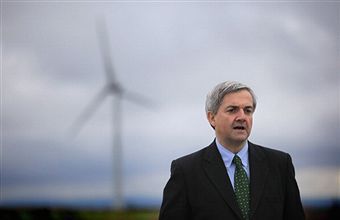What do the TUC, heavy industry and the European Commission have in common? This is not the start of a bad joke; the answer is that they all oppose the government’s energy policy.
Ten days ago, Tata (formerly British Steel) announced that it was to cut more than 1,500 jobs at plants in Scunthorpe and on Teeside. The directors later confirmed that their decision was influenced, in part, by the introduction of a costly carbon floor price at the last Budget.
The floor price, which exists on top of levies imposed by the EU, has increased the burden of taxation on energy consumption to subsidise renewable energy research. In last week’s issue of the Spectator, Matt Ridley predicted how this policy will likely be an expensive fiasco. As he noted, Ofgem, the energy regulator, estimates that household energy bills will double in the next decade thanks to government
policy. There are no projections for future business bills, but they are likely to be very significant.
Representatives of energy intensive industry fear that Tata is just the start. In March, an organisation called Verso Economics found that for every job created in the renewable power sector, 3.7 would be lost in the wider economy, which is supposed to be being rebalanced in favour of manufacturing. In a joint report, the Energy Intensive Users Group and the Trades Unions Council have warned that:
‘If the Government continues simply to add one energy or carbon reduction levy after another on to the energy intensive sectors then the risk is that these industries will no longer be able to compete internationally and will simply cease to operate in the UK.’
Lobbying falls on deaf ears in parliament because of the near total political consensus that Britain should lead the world in tackling climate change. Shadow
energy secretary, Meg Hillier, admitted in a recent interview that ‘there is more agreement’ on energy policy than any other policy area in Britain. (Indeed, Labour may have to review its position if the unions begin to shout their concerns.)
The political consensus has allowed the Department of Energy and Climate Change (DECC) to become a Whitehall powerhouse. As one leading business figure said: ‘it’s the only department that could pass £100bn of spending plans with little or no Treasury scrutiny.’ The lack of scrutiny means that there are serious question marks over the policy. Britain’s energy future rests on the Treasury and DECC estimate
that offshore wind farms will generate more than 32GW of energy from 2015. However, a recent consultation by the National Grid suggested that offshore output in 2020 would be closer to 12GW. There is a danger that the lights may go out.
To give Vince Cable his due, the Department of Business has been resisting DECC and the Treasury. Cable was embroiled in a recent Whitehall storm over the fourth carbon budget. Last week he blamed Tata’s decision on Britain’s green energy agenda.
At the Business Department’s behest, the government has promised to review the fourth carbon budget in December and again in 2014. However, industry representatives are not expecting substantial exemptions: energy policy is predicated on meeting targets for reducing carbon emissions, not protecting jobs and fostering economic growth, and there is palpable anger that the
government has refused to publish an energy policy impact assessment on manufacturers, presumably because its contents are so devastating. As one gloomy negotiator put it to me, ‘You get the impression that they’d be happy for us to shut up shop and take our carbon emissions with us.’
That hangdog view is not the huge exaggeration it first seems. While Britain is increasing its tax-funded subsidies for renewable energy, our European competitors are cutting theirs. Bureaucrats at the European Commission fear that
government policy is penalising British manufacturers in the single market. A glimpse of their concern can be seen in the Commission’s move to reform the Energy Taxation Directive in order to standardise subsidies and taxes across the continent. It is understood that the Commission is trying to force London to reduce its aggressive carbon reduction targets.
The TUC, big business and the European Commission, it’s a most unlikely triumvirate to protect British manufacturing jobs.






Comments